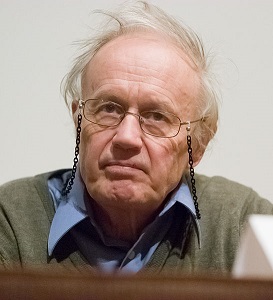
摘要
In trying to implement the general idea of quantum computing, a major difficulty arises from the phenomenon of "decoherence"-crudely speaking, any random influence from the environment of the system used as a quantum computer will tend to scramble the relative phases of the different quantum states which have to be superposed, and thereby destroy the computation. In recent years a very interesting technique to avoid the effects of decoherence has been proposed, by burying the phase relations in the many-body degrees of freedom of a complex physical system, in such a way that we can disentangle them but nature, unaided, cannot. I will introduce the general principles underlying this idea of "topological" quantum computing, and discuss briefly some of the physical systems which in principle might be used for it.
报告人简介
 Sir Anthony James Leggett, KBE, FRS (born 26 March 1938), also Tony Leggett, has been a Professor of Physics at the University of Illinois at Urbana-Champaign since 1983.
Sir Anthony James Leggett, KBE, FRS (born 26 March 1938), also Tony Leggett, has been a Professor of Physics at the University of Illinois at Urbana-Champaign since 1983.
Professor Leggett is widely recognized as a world leader in the theory of low-temperature physics, and his pioneering work on superfluidity was recognized by the 2003 Nobel Prize in Physics. He has shaped the theoretical understanding of normal and superfluid helium liquids and strongly coupled superfluids. He set directions for research in the quantum physics of macroscopic dissipative systemsand use of condensed systems to test the foundations of quantum mechanics.
邀请人:刘荧 yingl@sjtu.edu.cn
联系人:庄红蕾 hlzh@sjtu.edu.cn




